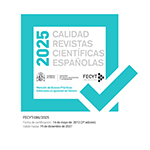Natives and Foreigners: The Construction of Categories in the Early Modern Spanish World
Abstract
This essay examines the meaning, uses and extension of the concepts ‘native’ and ‘foreigner’ in both Spain and Spanish America during the Early Modern period. It argues: i. that the distinction between natives and foreigners was not always important, not even relevant; ii. that discussions regarding these categories only happened when actors identified particular interests that they were willing to defend; iii. that nativeness and foreignness were not concrete situations but instead reflected the existence of a continuum that connected those totally native and those totally foreign, through a wide range of intermediary situations; iv. that the discourse regarding foreignness was also applied to those we currently identify as minorities in order to discriminate against them.Downloads
Article download
License
In order to support the global exchange of knowledge, the journal Cuadernos de Historia Moderna is allowing unrestricted access to its content as from its publication in this electronic edition, and as such it is an open-access journal. The originals published in this journal are the property of the Complutense University of Madrid and any reproduction thereof in full or in part must cite the source. All content is distributed under a Creative Commons Attribution 4.0 use and distribution licence (CC BY 4.0). This circumstance must be expressly stated in these terms where necessary. You can view the summary and the complete legal text of the licence.












